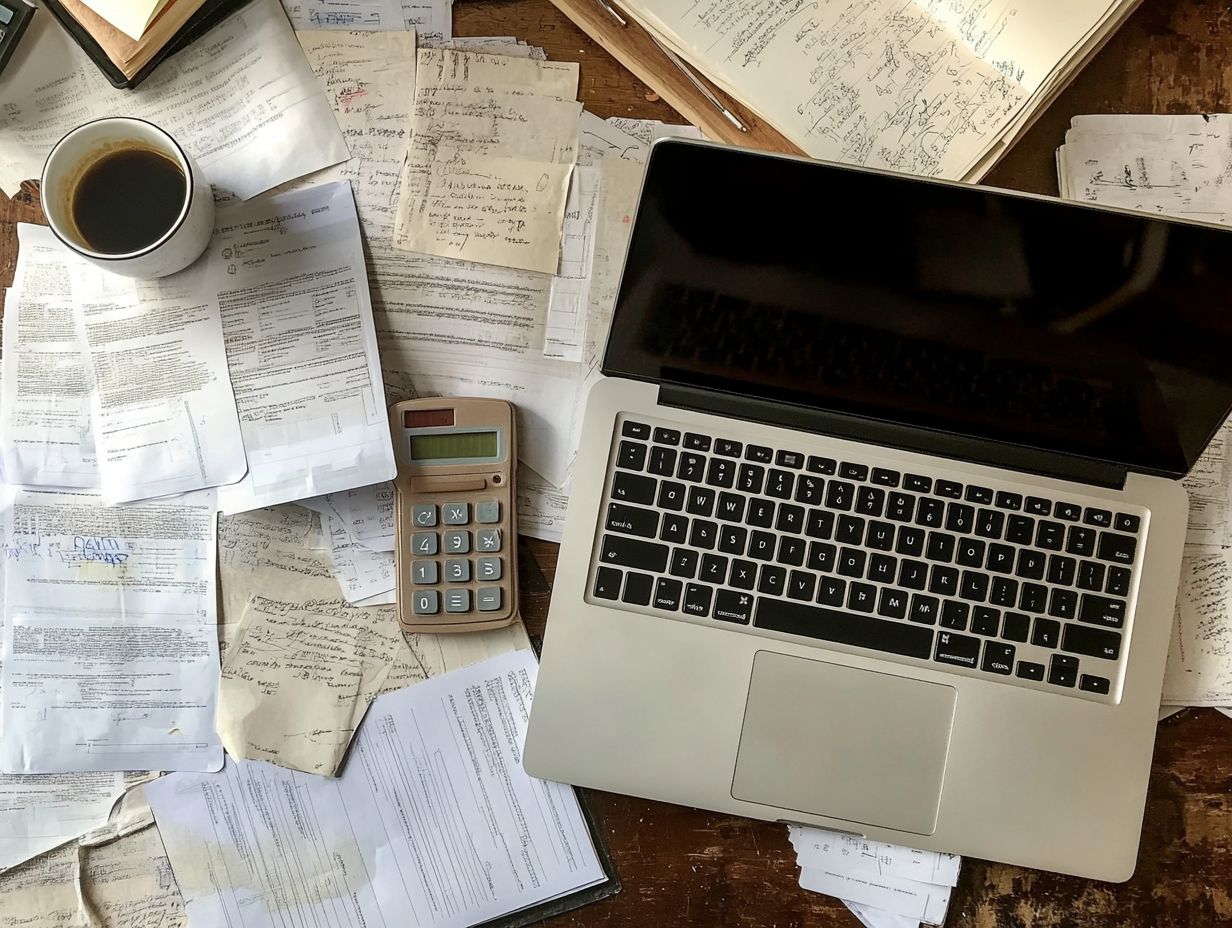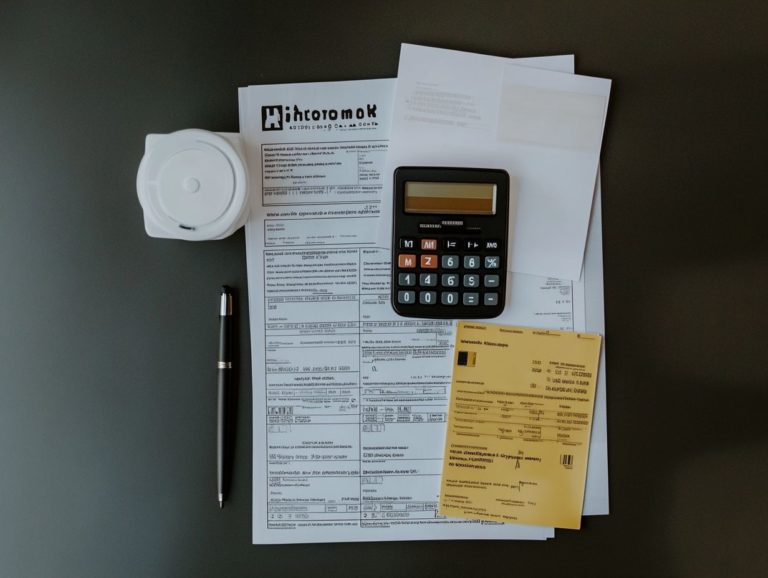5 Tax Mistakes Freelancers Make Every Year
Freelancing provides an enticing blend of flexibility and independence. However, it also brings unique tax challenges that can catch even the most experienced professionals off guard.
Many freelancers fall into critical traps that can lead to significant financial headaches later on, especially when dealing with clients and managing their bookkeeping. Failing to track expenses, neglecting to set aside funds for taxes, and overlooking valuable deductions can be quite costly.
Let s dive into the five common tax mistakes freelancers make each year, particularly regarding self-employment taxes, and offers practical tips to help you navigate the complexities of your tax obligations.
Stay one step ahead this tax season and safeguard your hard-earned income, including setting up an emergency fund.
Contents
- Key Takeaways:
- 1. Not Keeping Track of Expenses
- 2. Not Setting Aside Money for Taxes
- 3. Failing to File Quarterly Estimated Taxes
- 4. Not Taking Advantage of Deductions and Credits
- 5. Not Properly Reporting Income
- What Are the Tax Obligations for Freelancers?
- How Can Freelancers Keep Track of Expenses?
- What Are the Benefits of Setting Aside Money for Taxes?
- How Can Freelancers Calculate and File Quarterly Estimated Taxes?
- What Are the Most Common Deductions and Credits for Freelancers?
- How Can Freelancers Ensure They Are Reporting Income Accurately?
- What Are the Consequences of Not Filing Taxes Properly as a Freelancer?
- What Are the Best Practices for Freelancers to Follow During Tax Season?
- What Are the Tax Implications of Different Types of Freelance Work?
- How Can Freelancers Stay Organized and Prepared for Tax Season?
- Frequently Asked Questions
- What are the most common tax mistakes freelancers make every year?
- Why is it important for freelancers to track expenses?
- How can freelancers avoid penalties for estimated taxes?
- What common deductions can freelancers claim?
- Can freelancers deduct personal expenses?
- What should freelancers do if they find a tax mistake?
Key Takeaways:

- Freelancers must track expenses all year to report taxes accurately and claim deductions.
- Always save money for taxes to avoid surprises and penalties.
- Freelancers must file quarterly estimated taxes and properly report all income to comply with tax obligations. Professional tax advice from a CPA can help with accurate reporting and filing.
1. Not Keeping Track of Expenses
For freelancers, neglecting to track expenses can lead to significant financial pitfalls. This oversight impacts overall income and tax obligations, especially in managing job contracts and client payments.
Without careful tracking of expenses, you risk missing out on valuable deductions and may find it challenging to manage your personal finances effectively.
Utilizing accounting software like QuickBooks, Xero, Wave, or FreshBooks can simplify this process tremendously. These tools enhance financial transparency and support better business decision-making in the long run.
By employing these tools, you not only streamline the tracking process but also gain insights into your spending habits. This helps you pinpoint areas where you can cut costs. Regularly categorizing expenses allows you to maintain organized records, which is invaluable come tax season.
Efficient bookkeeping practices help you forecast your financial health, ensuring you can allocate resources more effectively and plan for retirement. The end result? A clearer financial picture that prompts informed decisions, ultimately leading to sustained growth and profitability.
2. Not Setting Aside Money for Taxes
Freelancers frequently underestimate the necessity of setting aside funds for taxes. This oversight can lead to considerable financial strain come tax season, potentially inviting penalties from the IRS.
This issue becomes even more pressing when you consider that self-employed individuals bear the responsibility for both income and self-employment taxes. These can collectively take a hefty bite out of their earnings.
Without diligent financial planning and a well-defined budget, it s easy for freelancers to mismanage their cash flow. This can leave them scrambling for funds as the filing deadline approaches.
By methodically saving a portion of each payment, including funds for health insurance and other expenses, you can confidently handle tax season! This ensures you fulfill your obligations without the last-minute stress or unexpected fees that can derail your hard-earned success.
3. Failing to File Quarterly Estimated Taxes
Many freelancers overlook the importance of filing quarterly estimated taxes. This crucial responsibility can result in penalties and interest from the IRS if not managed appropriately.
Grasping the timing and calculation of these payments is vital for your financial well-being. Typically, you ll estimate your yearly income to assess your tax liability and then divide that amount into four quarterly payments based on those projections.
Neglecting these payments can lead to not just financial penalties but also a hefty tax bill waiting for you at the end of the year. To navigate these responsibilities effectively, consider collaborating with a financial consultant. They can demystify the intricacies of tax calculations and filing deadlines, providing strategic insights to help you minimize potential liabilities.
4. Not Taking Advantage of Deductions and Credits
Freelancers often overlook valuable tax deductions and credits, including write-offs for health insurance and essential business expenses. This oversight can lead to paying way more in taxes than you need to!
By taking advantage of various deductions, such as home office expenses, equipment purchases, and even internet costs, you can effectively reduce your taxable income. Keeping thorough records, including receipts and invoices, is crucial for supporting these claims. Act now to secure your savings!
Consulting a Certified Public Accountant (CPA) can be incredibly beneficial, as they have the expertise to help you identify all potential advantages and ensure proper documentation, maximizing your tax benefits.
5. Not Properly Reporting Income

Accurate reporting of income is essential for you as a freelancer; overlooking this responsibility can create serious issues with the IRS and jeopardize your financial standing.
Diligently maintaining detailed records of all your income sources not only streamlines the tax filing process, but also ensures that you remain compliant with the law. Underreporting taxable income can lead to hefty penalties, interest charges, and even the dreaded possibility of audits situations that can be both stressful and time-consuming.
Being transparent about your earnings is vital for protecting your financial future. By adhering to IRS requirements and meticulously documenting every transaction, you can achieve a clear financial picture that facilitates better planning and management of your resources while fostering trust with tax authorities.
What Are the Tax Obligations for Freelancers?
As a freelancer, you’ll deal with various tax obligations that differ significantly from those of traditional employees. This includes self-employment taxes, or taxes you pay because you work for yourself, and quarterly payments required by the IRS.
Understanding how these various taxes affect you is essential. You might also face state and local taxes, which can vary greatly depending on where you operate. It’s important to grasp how these taxes impact your specific situation, including tax credits freelancers shouldn’t miss that you may qualify for as a freelancer.
Effective tax planning helps minimize your overall tax burden and ensures you stay compliant with all applicable laws. Given the complexities involved, seeking guidance from a financial consultant can provide you with invaluable, tailored advice, enabling you to make informed decisions about your finances.
How Can Freelancers Keep Track of Expenses?
You can effectively manage your finances by employing various methods to keep track of your expenses. Tools like QuickBooks, Xero, Wave, or FreshBooks can streamline your bookkeeping process significantly.
These platforms simplify your financial management and allow you to categorize expenses into predefined groups, making it easier to understand your spending patterns. Consider integrating mobile apps that enable you to capture receipts and expenses on the go. This way, you won t lose track of important financial records amid your busy schedule.
Maintaining organized digital or physical records throughout the year can simplify your tax filing process, making it easier to claim deductions when filing. Start organizing your expenses today and watch your savings grow!
What Are the Benefits of Setting Aside Money for Taxes?
Setting aside money for taxes isn t just about meeting your obligations. It s a smart move that fosters better financial planning and security for your future.
By proactively allocating some of your income for taxes, you reduce worry during tax season. This cultivates discipline in your budgeting, ensuring unexpected expenses won’t throw you off course.
As a self-employed individual, you can weave retirement options like a Solo 401(k) or a SEP IRA into your financial plan. These tools not only help you save for the future but also offer tax advantages that can lighten your overall liabilities. This creates a well-rounded approach to both current and long-term financial health.
How Can Freelancers Calculate and File Quarterly Estimated Taxes?
Calculating quarterly estimated taxes is essential for freelancers. It requires understanding your income and the relevant IRS guidelines.
Whether you’re just starting your freelance journey or have been working for years, the details of tax obligations can feel overwhelming. To navigate this, consider the top tax mistakes freelancers make and how to avoid them. Simplify this process by leveraging your previous income data and aligning it with your current earnings. Use the array of IRS resources available to you.
This step-by-step guide will lead you through the necessary calculations. Estimate your quarterly income based on past earnings and determine the appropriate tax rate. Armed with these tools, you ll effectively budget your finances and sidestep the last-minute chaos that often accompanies tax season.
What Are the Most Common Deductions and Credits for Freelancers?

As a freelancer, you can access many tax deductions and credits that boost your financial returns. Write off health insurance premiums, office supplies, and other business expenses.
If you work from home, you can deduct expenses related to your home office, including utilities and internet costs. Vehicle expenses for business purposes can also offer substantial deductions, whether you choose the actual expense method or the standard mileage rate.
Keeping meticulous records of all your business-related transactions is essential. Save receipts and invoices to back up your claims. Additionally, consider the 5 essential tax tips for creative freelancers that highlight the credits available for retirement contributions; these can further reduce your taxable income while helping you secure your financial future.
How Can Freelancers Ensure They Are Reporting Income Accurately?
To report income accurately, maintain clear records of all contracts and income. Align your reports with IRS requirements for taxable income.
Regularly managing your invoices is essential for maintaining a clear picture of your earnings. Generate invoices promptly after completing projects and diligently follow up on any outstanding payments to prevent cash flow issues.
Tracking payments received and pending can significantly reduce financial discrepancies. By reviewing your financial statements monthly, you can spot trends, understand your earnings cycles, and make informed decisions about future projects or services.
This proactive approach is key to ensuring your long-term financial health as a freelancer.
What Are the Consequences of Not Filing Taxes Properly as a Freelancer?
Neglecting to file your taxes properly can lead to serious consequences, including large penalties from the IRS and potential audits that could disrupt your financial stability.
These repercussions not only threaten your income but can also create undue stress. This stress impacts your productivity and overall peace of mind. Understanding your tax obligations is crucial, especially since you often manage different sources of income and deductions that can complicate your filings.
By investing time in tax education and seeking guidance from qualified professionals, you can navigate this complex landscape more effectively. This proactive approach minimizes errors and fosters a stronger financial foundation, allowing you to focus on your creative work with confidence.
What Are the Best Practices for Freelancers to Follow During Tax Season?
During tax season, prioritize best practices like keeping organized records, talking to a tax professional, and leveraging reliable bookkeeping systems to simplify your tax processes.
Creating a dedicated folder for all your tax-related documents will enhance your efficiency. Tracking your income and expenses throughout the year rather than scrambling at the last minute will ease the stress of preparing for tax filings and might even reveal potential tax breaks you hadn t considered.
Embracing technology is also key; using apps and software tailored for expense tracking can significantly minimize errors and save you precious time. Staying informed about the latest tax laws and deductions relevant to your business ensures you won t miss out on opportunities that could save you money.
What Are the Tax Implications of Different Types of Freelance Work?
The tax implications for freelancers can vary dramatically depending on the type of work you engage in, which in turn influences how you report your income and the deductions available to you.
For example, if you’re a freelance writer, you may be able to deduct expenses related to research materials and your home office setup. If graphic design is your forte, you could benefit from claiming costs associated with software and design tools. Additionally, consultants might discover that their travel expenses and professional development courses are deductible. To maximize your deductions, consider these tax planning tips for new freelancers.
These unique considerations mean you should adopt a tailored approach to your tax strategies, ensuring you maximize every available deduction and credit relevant to your specific field. By gaining a solid understanding of the tax landscape pertaining to your specialization, you can optimize your financial outcomes and navigate your obligations with greater ease.
How Can Freelancers Stay Organized and Prepared for Tax Season?

Getting organized for tax season is key for freelancers! You can use various tools and strategies to manage your finances and make filing a breeze.
By adopting a systematic approach to organizing your financial documents, you can significantly reduce stress. For example, sorting receipts and invoices into categorized folders like income, expenses, and deductions will save you valuable time when tax season rolls around.
Using user-friendly accounting software can automate many tasks, simplifying the tracking of income and expenses throughout the year. Setting reminders for important tax deadlines, such as estimated tax payments or filing dates, will help you steer clear of last-minute scrambling.
These proactive steps create a more manageable tax experience so you can focus on what truly matters!
Frequently Asked Questions
What are the most common tax mistakes freelancers make every year?
The most common tax mistakes freelancers make every year include failing to keep track of expenses, not paying estimated taxes, not properly reporting income, not taking advantage of deductions, and not properly separating personal and business expenses.
Why is it important for freelancers to track expenses?
Tracking expenses is essential for freelancers. It helps them report their income accurately, leading to potential tax deductions that reduce their tax bill.
How can freelancers avoid penalties for estimated taxes?
Freelancers should make estimated tax payments throughout the year. This approach prevents a large tax bill at year-end.
What common deductions can freelancers claim?
Freelancers can claim deductions for home office expenses, supplies, travel costs, and health insurance premiums. These deductions can significantly lower taxable income.
Can freelancers deduct personal expenses?
No, freelancers cannot deduct personal expenses as business expenses. Keeping personal and business finances separate is crucial to avoid IRS issues.
What should freelancers do if they find a tax mistake?
If freelancers discover a tax mistake, they should consult a tax professional immediately. Filing an amended tax return quickly can help correct the error and prevent penalties.






